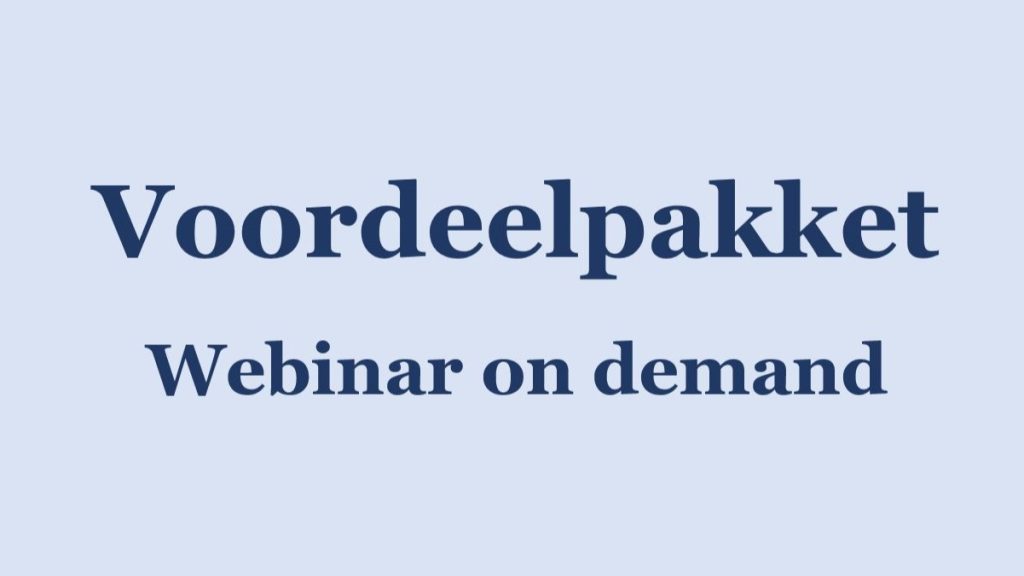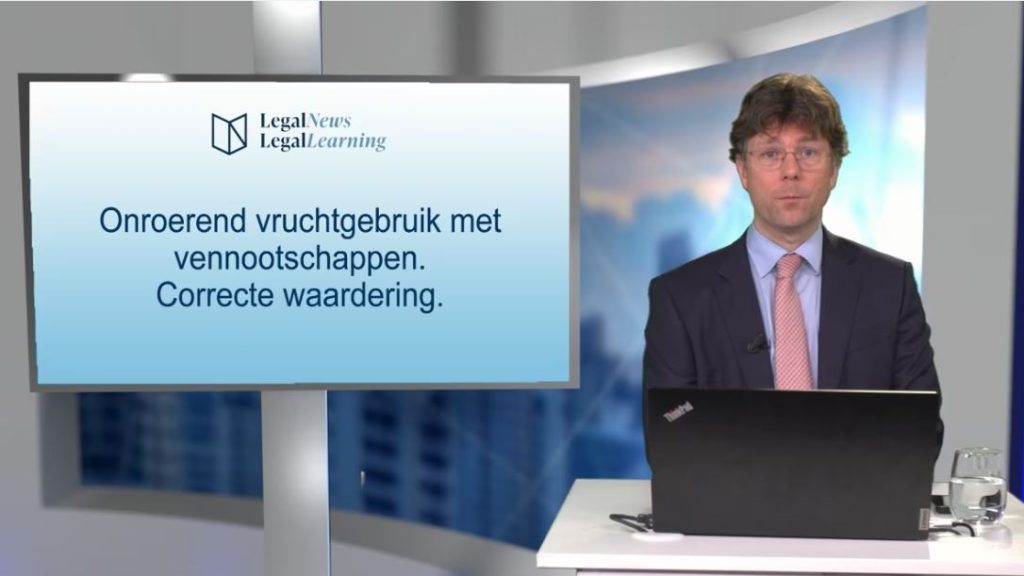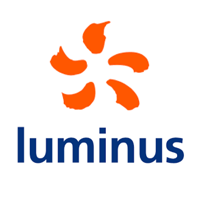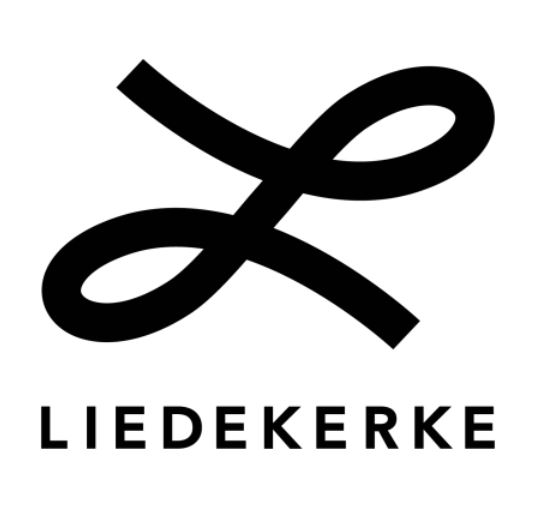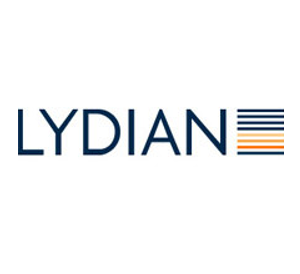Het nieuwe Boek 6 en de impact inzake verzekeringen:
een analyse aan de hand van 10 knelpunten
Mr. Sandra Lodewijckx en mr. Pieter-Jan Van Mierlo (Lydian)
Webinar op vrijdag 26 april 2024
Recente wetgevende ontwikkelingen
met impact op de bouwsector
Prof. dr. Kristof Uytterhoeven (Caluwaerts Uytterhoeven)
Webinar op dinsdag 27 augustus 2024
Zekerheden: een update
aan de hand van wetgeving en rechtspraak
Mr. Ivan Peeters en mr. Philip Van Steenwinkel (Hogan Lovells)
Webinar op vrijdag 8 november 2024
Woninghuur in Vlaanderen en Brussel:
het antwoord op 25 praktijkvragen
Mr. Ulrike Beuselinck en mr. Koen De Puydt (Seeds of Law)
Webinar op dinsdag 27 augustus 2024
Vereffening-verdeling van nalatenschappen:
16 probleemstellingen
Mr. Nathalie Labeeuw (Cazimir)
Webinar op vrijdag 26 april 2024
Het nieuwe Boek 6:
de impact op de werkvloer
Mr. Chris Persyn (Cautius)
Webinar op donderdag 4 juli 2024
IDD: what will be the impact on the Belgian insurance sector? (Lydian)
Authors: Sandra Lodewijckx and Anne Catteau (Lydian)
Date of publication: November 2017
On 23 February 2018, the new European directive nr. 2016/97/EU of 20 January 2016 on insurance (IDD), will enter into force in the Member States of the European Union. The IDD will replace European directive nr. 2002/92/CE of 9 December 2002 on insurance mediation (IMD), and its key objective will be to promote the integration of markets, to create a level playing field between the different types of distributors of insurance products, and to significantly increase the protection of consumers.
The IDD remains a minimal harmonisation directive, meaning Member States retain the possibility to adopt stricter legislation. Although the Belgian legislator, through the “AssurMiFID” regulations, got ahead of the European legislator, it should be noted that the IDD will bring certain innovations to Belgian insurance law.
The present article attempts to provide insights into the main changes made by the IDD with regard to the IMD, and its impact on the Belgian insurance sector. This article is based on the draft legislation available in November 2017, more precisely on a draft law on rules of conduct and another on access to the profession.
We would however like to draw the reader’s attention to the fact that, following the decision of the Committee on Economic and Monetary Affairs (ECON) of 16 October 2017, the European Parliament adopted on 26 October 2017 the following two decisions:
- It raises no objections to both Commission Delegated Regulations of 21 September 2017 which supplement the IDD (on product oversight and governance requirements and information requirements and conduct of business rules applicable to the distribution of insurance-based investment products);
- It asks the EU Commission not to modify the IDD transposition deadline (ie. 23 February 2018), but to adopt a legislative proposal setting the application date of IDD at 1st October 2018.
An official decision of the European Commission still has to follow, but all indications lead one to believe that the Commission will follow the same path as the ECON and the European Parliament.
1. To whom will the IDD be applicable?
The IDD will be applicable both to insurance undertakings and to insurance intermediaries, including ancillary insurance intermediaries.
First of all, the IDD is applicable to all distribution channels of insurance products, regardless of whether the client concludes a contract directly with an insurance undertaking or through an insurance intermediary. The main innovation of the IDD, therefore, is that it does not only apply to insurance intermediaries, but also to insurance undertakings, when they are selling their products directly.
In that regard, the IDD and the Belgian draft legislation do not use the term “insurance intermediation”, but “insurance distribution” and “insurance distributors”. The IDD will therefore be applicable to the activities of advising on, proposing, or carrying out other work preparatory to the conclusion of contracts of insurance, of concluding such contracts, or of assisting in the administration and performance of such contracts, in particular in the event of a claim. This definition corresponds to the current definition in the Belgian legislation, as modified in 2014. The IDD modifies this definition by bringing comparison websites and other comparison methods into its scope, especially when the client, at the end of the process, is able to directly or indirectly conclude an insurance contract.
Secondly, the IDD makes a clear distinction between insurance intermediaries and ancillary insurance intermediaries. The latter pursue the activity of insurance distribution as a professional activity additional to their principal professional activities and only distribute insurance products which are complementary to other goods or services (cf. connected contracts exemption). They fall outside the scope of IDD when they meet certain conditions. These conditions, however, have been modified with regard to the IMD. Namely, the IDD requires that insurance undertakings and insurance intermediaries who make use of such ancillary insurance intermediaries will have to ensure that the latter comply with certain baseline requirements with regard to consumer protection.
Furthermore, pure introductory activities will remain excluded from the scope of the directive. These include (i) the provision of information on an incidental basis in the framework of a professional activity, (ii) professional claims handling, (iii) (new) the mere provision of data and information on potential policyholders to insurance intermediaries or insurance undertakings, and finally, (iv) (new) the mere provision of information about insurance products, an insurance intermediary, an insurance undertaking to potential policyholders (which corresponds to the activity of client contributors under Belgian law).
Finally, the IDD will not apply to risks and obligations outside the European Union. This article has not been transposed into the draft legislation, as the Belgian legislator considered that a consumer on the Belgian insurance market should be able to benefit from the same protection for its risks located abroad, and that for this purpose the same duties to provide information and rules of conduct must apply.
2. Which duties to provide information and rules of conduct does the IDD impose?
a. Baseline rules of conduct and duty of care
The IDD first of all sets out baseline rules of conduct, including the obvious duty of insurance distributors to always act honestly, fairly and professionally in accordance with the best interests of their customers. Furthermore, the information provided to (potential) clients shall be fair, clear and not misleading. This “baseline rule of conduct” already exists under Belgian law.
Another essential duty of the insurance distributor is the duty of care. According to this principle, the distributor should determine the clients’ demands and needs and should make sure to offer insurance products that correspond with these demands and needs.
Moreover, insurance distributors should provide their clients with all the objective and relevant information about the insurance product in a comprehensible form while taking into account the complexity of the insurance product and the type of customer.
b. Duty to provide information
The IDD sets out which information the insurance undertakings should provide to the clients at the pre-contractual stage. It should be noted that this duty to provide information does not apply to large risks, and that the duty to provide information can be broadened by Royal Decree.
The IDD, and as a consequence also the Belgian draft legislation, introduce a certain categorisation of clients, which previously was not allowed under Belgian law. Henceforth, insurance distributors will be allowed to make a distinction between professional clients and retail clients. This distinction has already been partially introduced by the Royal Decree of 25 April 2014 on the advertising of financial services. Certain information (such as regarding the remuneration, yearly reporting to clients, the suitability and appropriateness test…) will not have to be provided to professional clients. The draft legislation still applies a distinction at this stage between small risks and large risks, which could possibly still lead to misunderstandings regarding the scope.
Another important amendment introduced by the Belgian draft legislation concerns so-called “collective insurances“. The draft, however, only addresses situations in which an individual member cannot take the decision to become a member to adhere (automatic adherence). In that case, it will be the responsibility of the representative of the group (the collective policyholder) to provide the members with the required information. For example, employers who conclude a collective insurance for their employees (other than an insurance of the second pillar, for example a hospital insurance), will have to provide the employees with the information required by law, which they should have received from the insurance undertaking or the insurance intermediary.
c. Transparency regarding remuneration
Moreover, the IDD provides for several rules with regard to remuneration of the activity of insurance distribution. The first is the general principle by which insurance distributors cannot be remunerated or evaluated in a way that conflicts with the duty to act in the interest of their clients. The second consists of a duty of transparency regarding the nature of the remuneration(s) received in relation to an insurance contract. The term “remuneration” is interpreted very widely; it namely includes any commission, fee, charge or other payment, including an economic benefit of any kind (regardless of whether it was paid by the client or by third parties). In addition, the intermediaries shall also provide certain information regarding their independence vis-à-vis the insurance undertaking whose products are being distributed. This duty is already a feature of Belgian law.
d. Duty to provide an “Insurance Product Information Document”
Henceforward, certain standardised information will have to be provided to clients regarding the insurance contract, by way of a standardised form, the “Insurance Product Information Document“. This duty, however, does not apply to large risks. Details on the precise content and format of this information document will be laid down by law. Moreover, the information which has to be mentioned in this document can be clarified or expanded by Royal Decree. This duty replaces the provision of an information sheet, which was introduced in Belgian law in 2014 and which has subsequently been postponed for an indefinite period.
e. Additional duties for insurance-based investment products
The IDD also imposes additional duties regarding insurance-based investment products. When offering an insurance-based investment product, the same duty of care applies, and the suitability and appropriateness of the product will have to be assessed. The (potential) client will have to be provided with sufficient information regarding insurances with an investment component, as well as regarding the fees and charges related thereto.
These additional requirements are already a feature of Belgian law, as they are part of the AssurMiFID regulations introduced in 2014, which made them applicable to all life insurance products (both savings and investments).
3. Will the rules on the combined offer be eased?
In the IDD and the Belgian draft legislation, “cross-selling” refers to combined offers of which at least one component is an insurance product. Contrary to current Belgian legislation, which prohibits combined offers when one of the components is a financial service such as an insurance product, the IDD offers the possibility of cross-selling when certain conditions are met.
In that regard, the IDD makes a new distinction between:
- The case where the insurance is the main product and the accessory product is not insurance. In such case, the distributor of insurance products has to indicate to the client whether it is possible to purchase the different components separately, and if so, the distributor has to provide the client with an adequate description of each of the components of the package, as well as of the costs and charges of each component.
- Otherwise, if the insurance is not the main product but the accessory product, the distributor has to offer the client the possibility to purchase the components separately. This provision, however, does not apply when the insurance is accessory to an investment service or an investment activity.
4. Would you need to put in place a “process for the approval of insurance products”?
The IDD introduces, before an insurance product is being commercialised (or when existing insurance products undergo a significant adaptation), the duty for insurance undertakings and insurance intermediaries which develop insurance products (“the developers”), to apply a process for the approval of insurance products, whereby they will have to determine the target market as well as distribution strategy for this target market.
Furthermore, the developers will have to regularly review whether the product still corresponds to the needs of the target market, and whether the envisaged distribution strategy is still appropriate. Finally, the developers shall make available to distributors all appropriate information on the insurance product and the product approval process, including the identified target market.
Even though it can be assumed that the developers already have certain internal approval processes, these procedures will henceforth be governed by law, and the application thereof will be monitored by the FSMA.
5. Are there any novelties regarding inclusion in the register, professional knowledge and competence requirements?
As regards the professional and organisational requirements, the IDD significantly expands the requirements for (re)insurance intermediaries, as well as for employees of (re)insurance intermediaries and of insurance undertakings. These requirements are now included in a detailed list in an annex to the IDD.
In this annex, a distinction is made between the minimum necessary knowledge for the distribution of (i) non-life insurances (branches 1 to 18), (ii) life insurances with an investment component (PRIIPS) and (iii) other life insurances.
It should be noted that from now on the persons responsible for insurance distribution and the persons in contact with the public will also have to meet the requirements of knowledge and professional competence.
It is moreover expressly provided that the required knowledge and competence will be subject to a yearly training of at least 15 hours, whereas the current legislation only requires 30 hours (10 hours a day) over a period of three years for insurance brokers and agents, and 20 hours over a period of three years for sub-agents.
As before, the IDD requires (non-excluded) insurance distributors to be registered in a registry with the competent authority in the Member State of origin.
The main modifications made by draft legislation concerns the fact that the insurance intermediary no longer has to apply for a registration in each of the insurance branches in which s/he wishes to be active, but for a registration in the group of insurance branches. A distinction is made between (i) non-life insurances, (ii) life insurances with an investment component and (iii) other types of life insurances.
It is the intention of the FSMA to ask intermediaries each year which insurance branches they are actually active in.
6. Have the competences of the supervisory authorities been extended?
The existing European passport issued to intermediaries of (re)insurance undertakings registered by an authority in the Member State of origin remains valid. The IDD, however, makes a distinction between the (re)insurance intermediaries that seek to be active under the freedom to provide services and those that act under the freedom of establishment.
The provisions of the IDD mainly differ with regard to the division of competences between the different supervisory authorities of the Member State of origin and those of the host Member Sate, and in particular regarding the procedure to be followed when distributors do not meet their obligations in the host Member State.
A novelty in the IDD is that the competent authority in the Member State of origin can refuse the establishment in another Member State, when it has doubts regarding the adequacy of the organisational structure or the financial situation of the distributor in question.
7. What conclusions are to be drawn?
Although Belgium played a pioneering role when it comes to the “Mifidisation” of the insurance distribution sector by imposing its AssurMiFID regulations as from 2014, the new IDD introduces several fundamental changes.
Those believing that compliance with the AssurMiFID regulations is sufficient to comply with the IDD, are mistaken. Every insurance distributor will, if applicable, have to revaluate its current models and practices in order to make the necessary adjustments.
» Bekijk alle artikels: Verbintenissen & Goederen, Verzekeringen & Aansprakelijkheid








